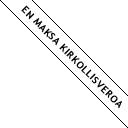The Sun Rises From the East
All across the old Europe, unemployment rates are high, close to or above 10%, GDP growth is weak (Finland, around 2%, Germany, less than 2%) and people have less money to consume (high price level meets high taxes). The same can't be said about our Eastern friends, the so called "emerging markets", who entered the EU last year. Flat tax rate and more flexible labor markets are creating dynamic economic growth and unemployment rates are dropping along with corruption, which has plagued the Eastern Europe ever since Communism was forced upon them by Stalin.
This, the economic growth of Eastern Europe, is a great thing since it will set an example for the rest of us, for the so called "welfare" states in Scandinavia and Western Europe. The answer to our continuing problems is not that far away. One doesn't have to look all the way to the United States anymore to learn how to create a dynamic economy.
In East, Labor unions have not yet gained much ground, mostly because people are still sceptic of them. The unions worked as weapons of Soviet propaganda back in the days of Communism. At this point, labor unions could only stagnate the economical growth.
In the midst of all this is Russia, the shithole of the world. Corrupt and oppressed, run by former communists and KGB men, Russia has failed pretty much in every respect. Last week the Duma approved a legislation which severely restricts the rights and freedoms of non governmental organizations (NGOs). In Russia, starting a business is a pain in the butt, a process which takes time, extra money and extra motivation. Belarus is another example of a country that's heading toward its own failure.
And no - there isn't going to be any "mass migration" to Old Europe. Business is good - why would these people, the Eastern Europeans, leave their countries?
A lot remains to be done. There's still a lot of corruption, poverty, restrictions and unemployment, but they're definitely moving in the right direction, unlike the Old Europe.
"In the next 10 years, the gap between per capita incomes in the old and new EU member states will progressively close," forecasts Andreas Polkowski of the Hamburg Institute of International Economics (HWWA). "Some regions may even overtake us."
Merry Christmas!
Links: EU Rota, Der Spiegel, Redstate.org.

Labels: english





